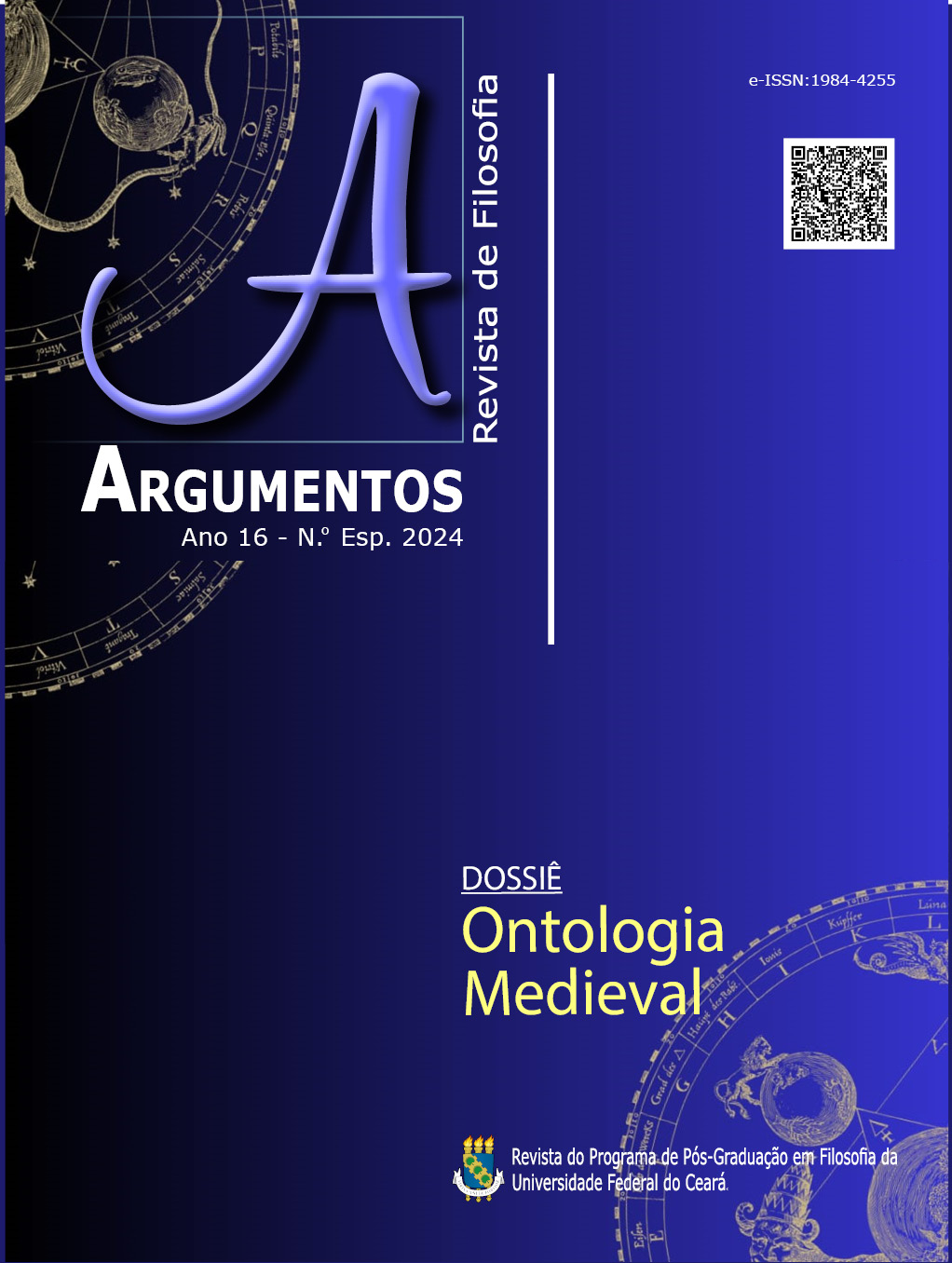Al-Fârâbî: Being and the ontological structure of the universe
Keywords:
Arabic Philosophy. Alfarabi. Being. Necessary Being. First Cause. Universe.Abstract
After an introduction pointing out the reception of Greek philosophy in the Arab and Islamic world after its expansion from Arabia in the Near East, with the assimilation of Aristotelian and Neoplatonic doctrines, this article aims to present the notion of being proposed by the philosopher Alfarabi (d. 950) as well as the ontological hierarchy of the universe, based on the idea of Necessary Being, First Being and First Cause, the source of all reality.
References
AL-FARABI’s philosophischen Abhandlungen aus Londoner, Leidener und Berliner Handschriften. Leiden: J. Brill, 1890.
AL-FARABI. Book of Letters (Kitâb al-hurûf). Commentary on Aristotle’s Metaphysics. Arabic Text, Edited with Introduction and Notes by Mahdi, M. Beirut: Dar el-Mashreq, 1969.
AL-FARABI. Catálogo de las ciencias. Edición y traducción castellana por González Palencia. 2. ed. A. Madrid-Granada: C.S.I.C., 1953.
AL-FARABI. Kitâb al-milla wa-nusûs ujrâ. Edición por M. Mahdi. Beirut: Dar el-Machreq, 1968.
AL-FARABI. Kitâb tahsîl al-sa’âda (Libro sobre la adquisición de la felicidad). Ed. Ŷ. Al-Yasim. Beirut: Dar al-Andalus, 1981.
AL-FARABI. La Ciudad Ideal. Traducción por M. Alonso. Madrid: Ed. Tecnos, 1985a.
AL-FARABI. Obras filosóficas y políticas. Trad. esp. por R. Ramón. Madrid: Ed. Trotta, 2008.
AL-FARABI. On the Perfect State. Abû Nasr al-Fârâbî’s Mabâdi ârâ’ ahl al-madîna al-fâdila. Revised text with introduction, translation and commentary by R. Walzer. Oxford: Clarendon Press, 1985.
AL-FARABI. The political Regime (Al-siyâsa al-madaniyya also known as the Treatise on the Principles of Beings). Arabic text, edited with an Introduction and notes by F. M. Najjar. Beirut: Imprimerie Catholique, 1964.
AL-GAZÂLÎ. Faysal al-tafriqa (Libro sobre la diferenciación entre el Islam y la Zandaqa). Cairo: ‘Isa al-Babi al-Halabi, 1961.
AVERROES. Tahâfut al-tahâfut. Edicted by M. Bouyges. Beirut: Imprimerie Catholique, 1930.
AVERROES. Tafsîr mâ ba`d al-tabî`a (Grand Commentaire de la Métaphysique). Texte árabe inédit établi par M. Bouyges. Beirut: Dar el-Machreq, 1938.
AVICENA. The life of Ibn Sînâ. A Critical Edition and Annotated Translation by W. E. Gohlman. Albany: State University of New York Press, 1974.
BADAWI, A. La transmission de la philosophie grecque au monde arabe. Paris: J. Vrin, 1968.
CHELLI, M. La parole arabe. Une théorie de la relativité des cultures. Paris: Ed. Sindbad, 1980.
DAIBER, H. Aetius Arabus. Die Vorsokratiker in arabischer Überlieferung. Wiesbaden: Franz Steiner Verlag, 1980.
DAIBER, H. The ruler as philosopher: a new interpretation of al-Fârâbî’s view. Amsterdam: NorthHolland Pub. Co., 1986.
DRUART, Th.-A. “Al-Fârâbî, Emanation, and Metaphysics”. En: MOREWDGE, P. (Ed.). Neoplatonism and Islamic Thought. Albany: Suny Press, 1992. p. 127-148.
GARDET, L.; ANAWATI, G. Introduction a la théologie musulmane. 2. ed. Paris: J. Vrin, 1970.
GUTAS, D. Greek Thought, Arabic Culture. The Graeco-Arabic Translation Movement in Baghdad and Early Abbâsid Society (2nd-4th/8th-10th centuries). London; New York: Routledge, 1998.
KHALIL, A, “Some Tensions in Farabi’s Metaphysics of the One and the Emanative Descent”. Transcendent Philosophy, London, 1, 2000, p. 83-108.
MASSIGNON, L. La passion d’al-Hosayn-ibn-Mansour al-Hallaj, martyr mystique de l’islam. Paris: Librairie Orientaliste Paul Geuthner, 1922.
NETTON, I. R. Allâh Trascendent. Studies in the structure and semiotics of Islamic Philosophy, Theology and Cosmology. London; New York: Routledge, 1989.
PETERS, F. E. Aristoteles arabus. The Oriental translations and commentaries on the Aristotelian Corpus. Leiden: J. Brill, 1968.
PETERS, F. E. Aristotle and the Arabs. The Aristotelian Tradition in Islam. New York: New York University Press, 1968.
RAMÓN, R. Al-Fârâbî y la ‘Metafísica’ de Aristóteles. La Ciudad de Dios, El Escorial, n. 196, 1983, p. 211-240.
RAMÓN, R. Una introducción de al-Farabi a la filosofía. Al-Qantara, Madrid, n. 5, 1984, p. 5-14.
RAMÓN R. Al-Fârâbî: El concepto del ser. Revista de Filosofía, Madrid, año 3, v. VII, n. 11, 1994, p. 27-49.
RAMÓN, R. Comentario de Averroes a Metafísica V. 7. En torno a Aristóteles. Homenaje al Profesor Pierre Aubenque. Santiago de Compostela: Departamento de Filosofía e Antropoloxía Social de Universidad de Santiago de Compostela, 1998. p. 403-418.
RAMÓN, R. The Language of Being: From Ibn Sînâ to Mullâ Sadrâ. Islam – West Philosophical Dialogue, The Papers presented at the World Congress on Mulla Sadra. Volume 5: Mulla Sadra and Comparative Studies. Teheran: Sadra Islamic Philosophy Research Institute Publication, 2002. p. 333-350.
RAMÓN, R. A ‘Cidade Excelente’ de Alfârâbî. Tiraz, São Paulo, n. 3, 2006, p. 90-103.
RUDOLPH, U. Die Doxographie des Pseudo-Ammonios. Ein Beitrag zur neuplatonischen Überlieferung im Islam. Stuttgart: Franz Steiner, 1989.
Downloads
Published
Issue
Section
License
Copyright (c) 2024 Rafael Ramón Guerrero

This work is licensed under a Creative Commons Attribution 4.0 International License.
Argumentos magazine is licensed under an International Creative Commons Attribution License.
The Magazine uses CC BY inclusion
1) The authors retain the copyright granted to the magazine or the right to initial publication, with the work regularly licensed under the Creative Commons Attribution, which allows the sharing of the work with acknowledgment of authorship and initial publication in this magazine.
2) The authors are authorized to contract additional applicable contracts, for non-exclusive distribution of the version of the work published in this journal (for example, publication in the institutional repository or as a chapter of the book), recognition of authorship and initial publication in this journal.
3) Authors are authorized and encourage to publish and distribute their work online (for example, in institutional repositories or on their personal pages) at any time before or during the editorial process, as they can generate productive changes, as well as increase the impact and reference of published work.




.jpg)










._._3.png)
1.jpg)
._._._.png)
